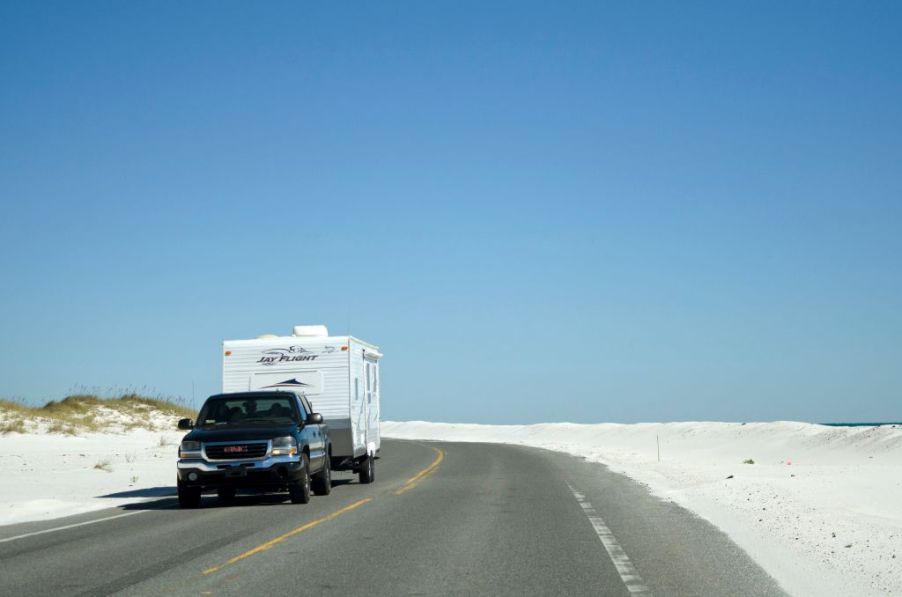
Towing for Beginners: How to Determine Your Vehicle’s Towing Capacity
You’re about to embark on a new journey, one that includes hauling a trailer. If you’ve never pulled one behind you before, or you have little experience with it, you might find yourself confused about the little details.
Whether you have a powerful truck or a light-weight car, you still need to know the basics of towing, especially your vehicle’s towing capacity. Don’t worry if you have no clue what that even means. To help you learn what it is, how to calculate it, and why it’s important, we’ve come up with this brief guide.
What is towing capacity and why is it important?
Towing capacity refers to the amount of weight a vehicle can tow when pulling a trailer. Exceeding that amount would put unnecessary stress on your vehicle’s engine, and could damage your transmission and the rear axle. You could also jeopardize the safety of yourself, your passengers, and other drivers on the road by exceeding your vehicle’s towing capacity.
On the inside driver’s door frame, you will find a certification sticker or plate that contains important information about the car or truck. You can also find it in your vehicle’s owner’s manual. For towing information, you may need to know the following acronyms:
GVWR: Manufacturers use a gross vehicle weight rating to show how much total weight the car or truck can handle without a trailer. This would include the weight of the vehicle, passengers, and cargo.
GVW: Gross vehicle weight is the manufacturer’s estimated total weight of the car or truck with all fluids (gas, transmission, etc … ), passengers, and cargo. The actual weight, though, could vary depending on what your cargo is and how many passengers are riding with you at one time.
GCWR: This is the gross combined weight rating. It includes the weight of the vehicle, passengers, cargo, and trailer with a load. The GCWR number is your maximum allowed total combined weight. Exceeding that could damage your vehicle.
GAWR: The gross axle weight rating shows how much weight a single axle can safely handle.
If you’re planning to buy a truck to handle a trailer or buy a trailer to tow with your current vehicle, you will need to know some of these weight figures.
How to figure out towing capacity
The short answer is that you want to make sure the weight of the trailer and its load doesn’t exceed the gross vehicle weight rating of your truck, car, or SUV. In standard situations, if your vehicle’s GVWR is 10,000 lbs and you only plan to haul 1,000 lbs of cargo, you’re good to go. But that’s not always the case.
If you feel you might be close, you will need to dig a bit deeper. Let’s say you have a truck that’s rated for 12,000 lbs. If you want to haul a camper trailer that’s 10,000 lbs, you could potentially exceed the rated towing capacity of your vehicle. You must determine what your actual combined weight is with towing vehicle, passengers, cargo, and camper. Then you’ll need a calculation of all the items you plan to put into the camper, like bedding, linen, food, and water. Those items might put you over.
Check your tongue weight, too
You should also pay attention to your tongue weight. The tongue is a device that connects the trailer to the towing vehicle. According to General Motors, the tongue weight on conventional trailers and ball mount hitches should be 10-15% of the total weight of the trailer and its load. So, for a loaded trailer weighing 1,200 lbs, your tongue should weigh 120-180 lbs. For gooseneck or 5th wheel campers, they recommend 15-30%.
Other towing tips for a safe ride
First, check with your state’s laws concerning towing. AAA’s list will help guide you in finding out what laws you may need to adhere to. Many states have relatively lenient regulations, while others have special requirements. Be sure to consult the laws in your state and any state you plan on traveling to with your trailer.
Always take your time when preparing a trailer and its load. Double and triple check to be sure all items are secure and you have the trailer connected properly. This will help you avoid any accidents that could occur if something was done incorrectly.
Knowing and following your towing capacity will help keep your vehicle and your passengers safe. Don’t exceed the recommended rating for your towing truck or car just for the sake of saving money or time. Your life, as well as others, could be at risk.


